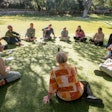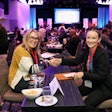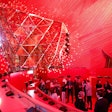Despite a remarkable string of growth, the meetings industry may be under a false sense of security. That’s the fear of MPI President and CEO Paul Van Deventer and others who warn that all good things come to an end. Does that mean the industry’s bubble is about to burst as it did a decade ago? It’s too soon to tell, but beware these signs.
THE ECONOMY
Regardless if you feel the economy’s growth has been fast enough or not, the fact remains the country has been on an upward swing since 2009. “We’re in the midst of one of the longest economic recoveries in history; it has to end,” Van Deventer says. The cost of doing business will change—Van Deventer guesses within two to three years—and event professionals need to be ready. That means compiling valuable ROI reports and other data now in case budget directors once again put meetings in their crosshairs. “I encourage our community to be thinking about how they would manage [events] if they had to do them on a smaller budget or without the resources they have today,” says Van Deventer.
POLITICS
Whether it’s populism, nationalism, isolationism or flat-out racism, no ism is particularly good news for meetings. The U.S. Travel Association has repeatedly raised concern that President Trump’s travel restrictions and pledge to erect a border wall with Mexico threaten to hurt leisure and business tourism. At the very least, according to USTA, the country needs better messaging. “The American travel community continues to feel that both security and economic objectives could benefit from a clear message that these policy moves are tailored to specific issues,” says U.S. Travel Association Executive Vice President of Public Affairs Jonathan Grella. “The world needs to know they are not intended to discourage travel.”
RISK MANAGEMENT
Van Deventer has trouble believing the statistics that continue to show about 50 percent of planners don’t have an emergency preparedness plan. “It’s crazy,” he says, shaking his head. “We work in a soft target environment; that's the reality.” October’s deadly shooting in Las Vegas only underscores the point. Beyond the obvious terrorism threats or travel warnings, planners need to be prepared for extreme weather. Beyond natural disasters, don't forget the 120-degree temperatures Las Vegas and Phoenix experienced this summer. If attendees don’t trust they are in good hands, they won’t come to an event.
CREATIVE STAGNATION
Meeting planners love to throw creativity around as a buzzword ad nauseam. But a study from IACC, an association for small-meeting venues, suggests there’s far less action than talk. Consider that the report, which surveyed more than 180 planners, found 64 percent of those polled say they tend to book at box hotels despite many respondents saying they don’t associate those venues with creativity. “The industry has to figure out how to provide [creative] setups more effectively,” says IACC CEO Mark Cooper. It’s imperative for venues to educate planners on better options, or risk attendees become disengaged. “If you wait for the customer to tell you what they want, you will be waiting forever,” Cooper warns.















